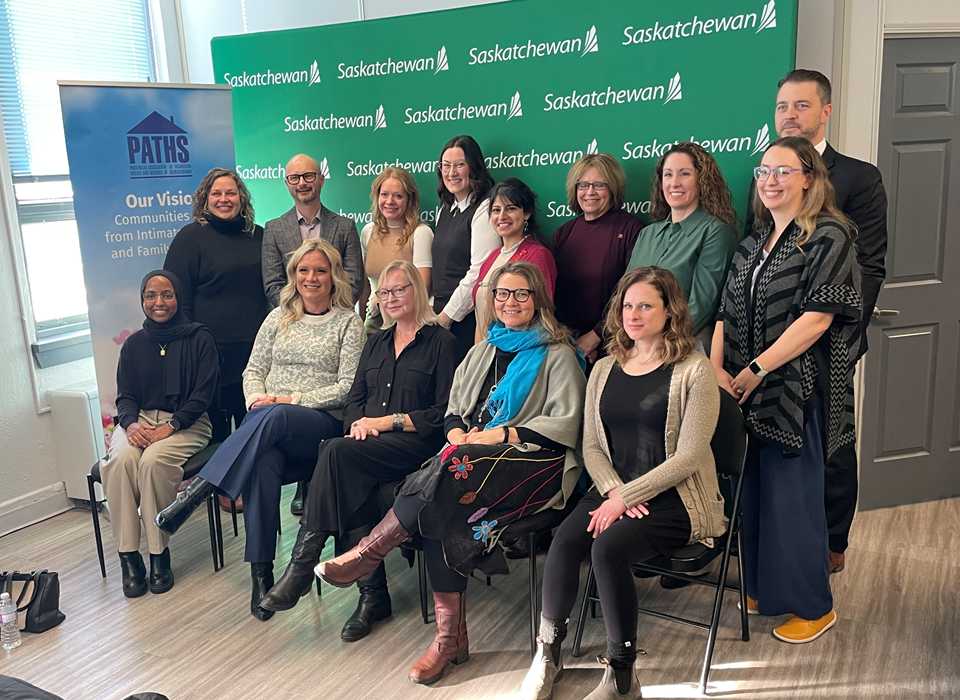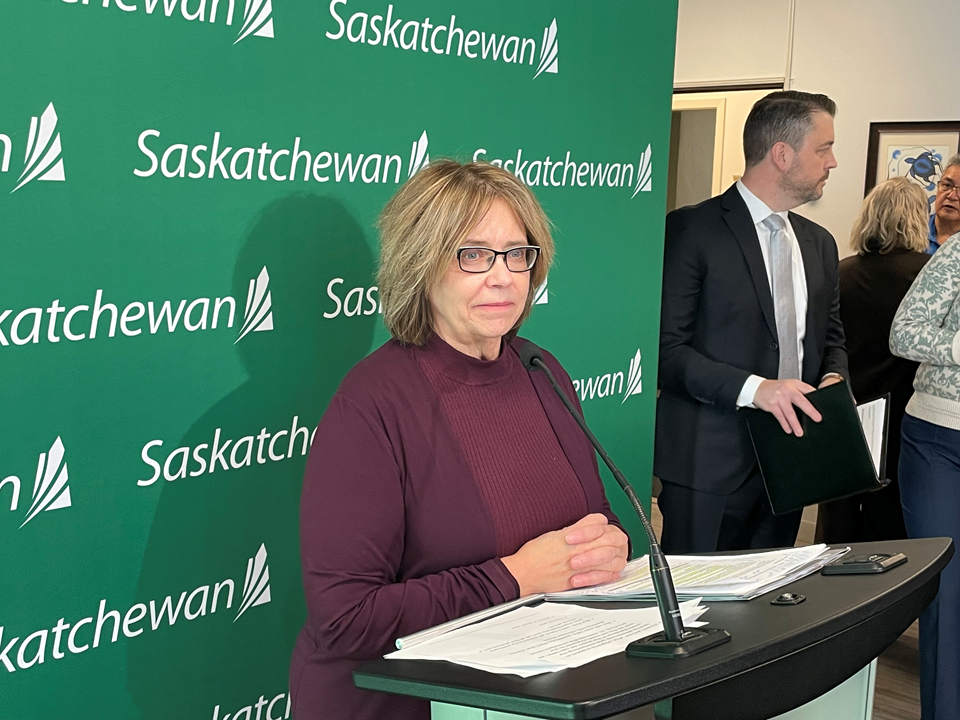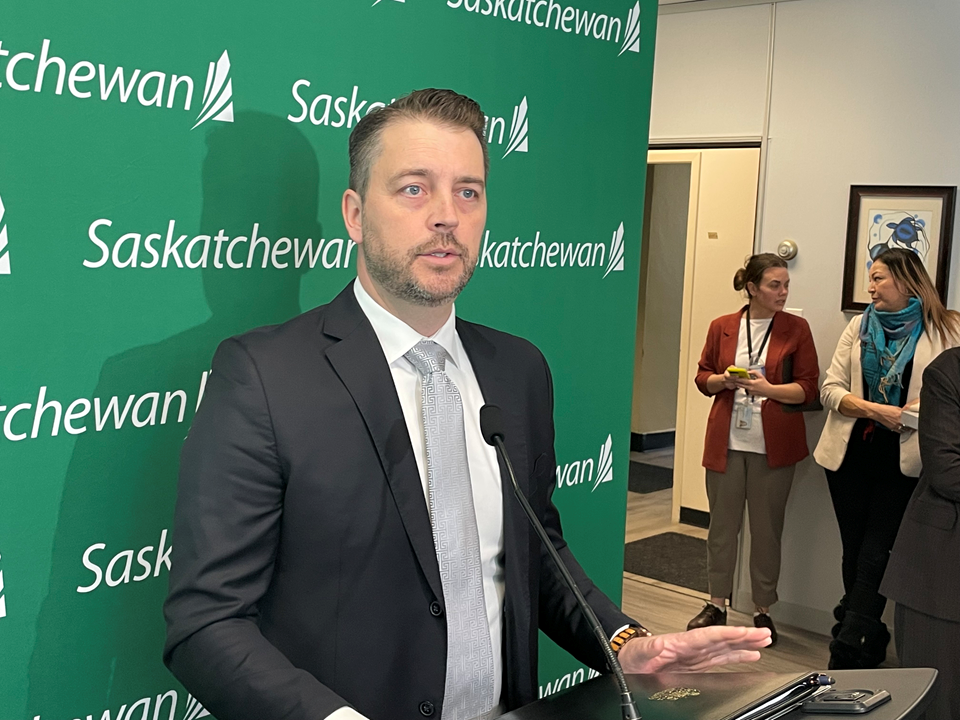REGINA - After a Domestic Violence Death Review released last week called on the Sask. government to step up its services to prevent gender-based violence, the provincial government announced today $3.8 million of funding over the next two years towards 16 agencies across the province to end the issue and educate children on the matter.
The funding is part of the National Action Plan to End Gender-based Violence.
At a media event on Monday, Alana Ross, Minister Responsible for the Status of Women, said this initiative is important to support community organizations that can help end gender-based violence.
During her scrum, Ross kept mentioning preventing gender-based violence from happening. A reporter asked Ross why that was so important. She answered with, "A lot of what prevention does is it teaches our children what gender-based violence is. It's very important because if we start with prevention, it's like any other form of care. The more we can prevent, the fewer instances we have of gender-based violence."
Another part of the announcement was giving children education on gender-based violence. Ross spoke about the importance of kids understanding and processing what they might see at home.
Ross also pointed out, "they [children] may not know the difference [between what is gender-based violence and what is not]. They need to learn to understand because the future generations, with the understanding [can help with what] we're working towards, [which is] eliminating gender-based violence in our province. Education is a big part of that."
In terms of the provincial government investing in the prevention of violence, Tim Mcleod, Justice Minister and Attorney General, noted how over $31 million last year from the 2024-25 budget was invested into stopping violence towards women, children and interpersonal relations.
Mcleod also notes that the government is aware that alcohol and drug use is an underlying cause of gender-based violence, so investing in mental health and addiction services will help reduce those numbers.
Last week, the provincial government announced a new 20-bed recovery & wellness centre that will be built on the Ochapowace Nation as a part of their nearly $50 million investment to tackle drug addictions.
One of the community-based partners that will receive the funding to prevent gender-based violence is the Provincial Association of Transition Houses and Services of Saskatchewan Inc. (PATHS)
Jo-Anne Dusel, executive director of PATHS, spoke about how the service is working towards developing a common assessment tool to identify risks to eliminate partner violence.
Dusel went on to mention, "[we want to] ensure that when someone is experiencing intimate partner violence, and they interact with whatever sector it might be, it might be health, it might be social services, it might be law enforcement, or they could be reaching out to one of the frontline agencies that do this work, [So that] everyone is speaking the same language and knows what resources are available in the province and can navigate that individual, if you will, through the system."
She was asked if people struggle to get help because they don’t know where to go. Dusel mentioned what Ross had spoken about earlier, educating people to understand what they’re experiencing.
The talking point then shifted to the report that came out last week. In the report, it was found that Sask. reviewed 31 deaths related to intimate partner violence between 2015-2020.
It was also noted that intimate partner deaths were higher in rural areas versus urban areas. Additionally, over 50 per cent of the adult victims were Indigenous as well.
When discussing the report, Dusel said, "I strongly feel that Saskatchewan needs an action plan that could actually be mapping all of the initiatives that have taken place. And there are many in the last number of years, and many more that are being announced here today. 'Why aren't we measuring them, setting goals, evaluating, updating regularly?' So we know that what we're doing is working."
Another statistic of the report noted more than 80 per cent of the victims were women.
Responding to a question about the stats, Dusel said self-reported intimate partner violence can sometimes be equal in terms of the perpetrators.
"Not all men use violence in their relationships, she said, but added there are historical cultural norms that say men have felt in charge when in a relationship with women.
Dusel even used the current misogyny happening in the U.S. right now as an example of hatred and violence towards women.
She wants to use all those factors to determine how Sask. can end gender-based violence.
The full list of agencies receiving funding as part of today’s announcement is listed below:
- Natural Supports Program ($635,000): Saskatchewan Toward Offering Partnership Solutions to Violence;
- Enhanced Early Intervention Supports ($1,100,000): Collaboration between Family Service Regina Inc. and Family Service Saskatoon;
- Healthy Relationships Program ($513,000): The John Howard Society;
- Adverse Childhood Experiences Awareness and Prevention ($485,000): Praxis Consulting Inc.;
- Common Intimate Partner Violence Assessment Tool ($300,000): Provincial Association of Transition Houses and Services of Saskatchewan Inc. (PATHS); and
- Human Trafficking Prevention Toolkit ($297,000): Saskatoon Downtown Youth Centre (EGADZ)
- Second Stage Housing Capacity ($215,000):
- Lloydminster Interval Home Society Inc. ($40,000)
- Prince Albert Safe Shelter for Women Inc. ($40,000)
- Sofia House Inc. ($40,000)
- YWCA Regina Inc. ($38,855)
- YWCA Saskatoon Inc. ($36,000)
- Saskatoon Interval House Inc. ($20,000)
- Transition Home Capacity ($214,000):
- Lloydminster Interval Home Society ($40,000);
- Regina Transition House ($40,000);
- YWCA Regina Inc. ($39,644);
- YWCA Prince Albert Inc. ($39,000);
- Moose Jaw Women's Transition Association Inc. ($35,000);
- Saskatoon Interval House Inc. ($20,000); and
- Safe and Together Training ($42,000): PATHS.






